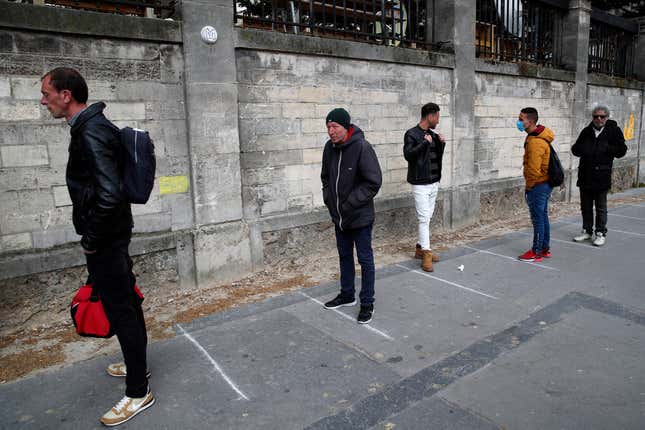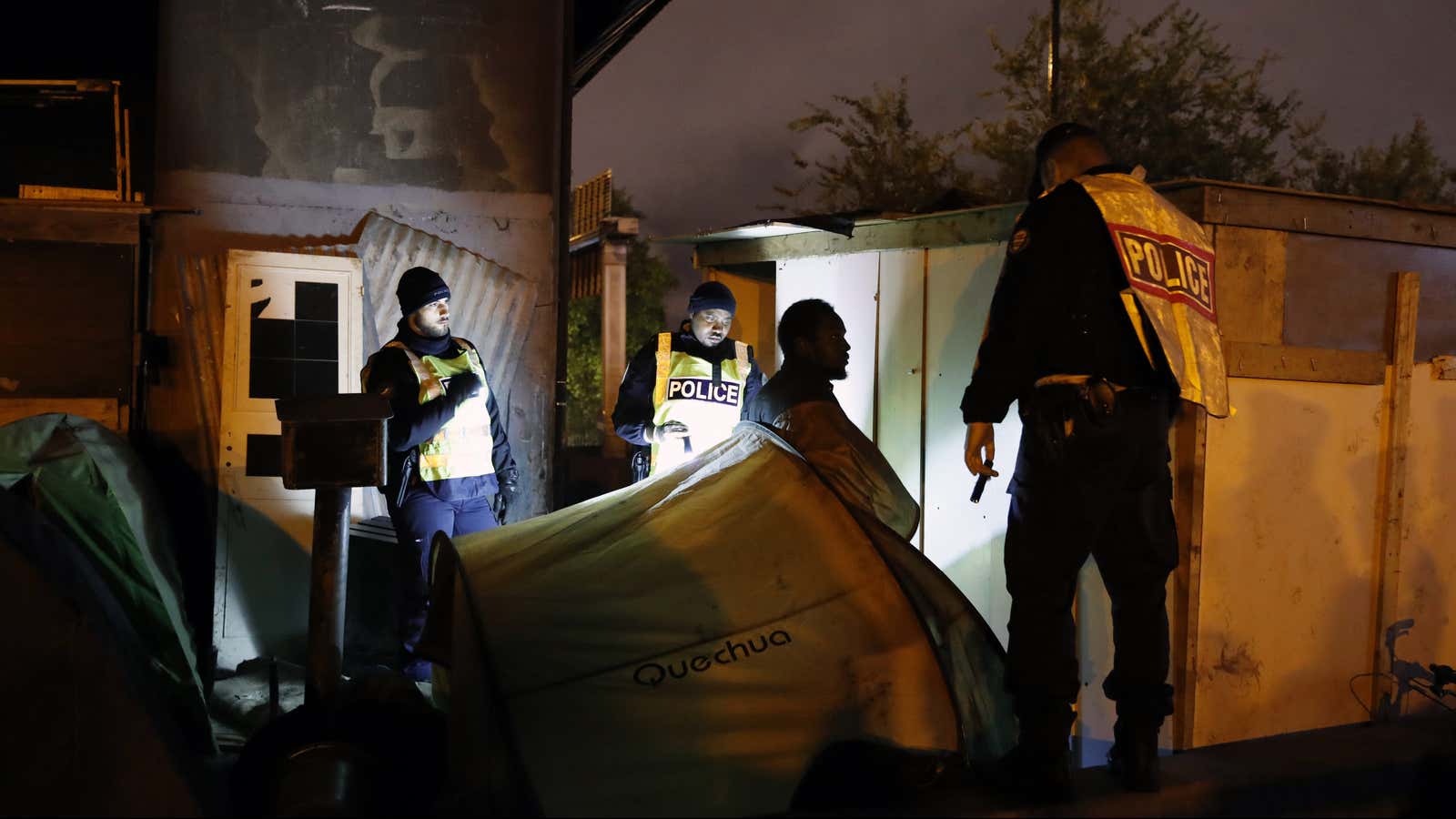Until recently, around 3,000 homeless migrants lived in makeshift camps in the streets and public parks of Paris’ north. Long before France became the first country in Europe to confirm a positive case of the Covid-19 respiratory disease in late January, many migrants lived in temporary or communal housing, or on the street. They faced poor sanitary conditions and lacked access to basic medical care. The same people have also been confronting a crack epidemic, harassment from police, exploitative working conditions, and repeated evictions by the authorities.
As the global pandemic continues, migrants, activists, and advocates are raising the alarm in France, warning that people without legal status living outdoors, in overcrowded communal housing, or in other poor conditions are particularly vulnerable to the novel coronavirus.
At the time of publishing this article, there are a reported 83,080 confirmed cases of Covid-19 in the nation and 10,887 deaths, meaning it currently bears the ominous distinction of having the world’s fourth-largest Covid-19 death toll. It’s not clear how many of the deceased and sick are migrants; and as France has fallen behind some other European countries in testing, there are likely many uncounted cases.
Even in ordinary times, data on undocumented migrants has been scarce. According to one government estimate, between 350,000 and 400,000 people without legal status live in the country. In 2018, migrants made up nearly 10% of France’s population. Millions of migrants and refugees have arrived in Europe since 2015, when migration to the continent saw an uptick as many sought relief from conflict and poverty, and tried for a better life.
Omer, a 34-year-old refugee from Sudan who lived in a refugee camp in the city, said that, although he didn’t know any migrants infected with the virus, he felt that “there is no concern for refugees here.”
At its largest, the migrant camp in the northern city of Calais, nicknamed the “the jungle,” housed more than 10,000 migrants. It was demolished by the government in 2016. Last year, Leilani Farha, the United Nations’ special rapporteur for housing, condemned sanitary conditions of the migrants who remain in Calais—and in France generally—calling on the French government to address their “dire” situation.
What does a stay-at-home order mean for the homeless?
In mid-March, the government imposed a series of increasingly stringent regulations on French public life to stem the virus’s spread, which means that at present all people in the country are barred from leaving their houses except for essential travel. The lockdown is enforced by police, and people outside of their homes must carry a signed document explaining their reason for being out.
What this means for migrants, including those who have no homes to go to, has been varied.
Since the virus began to gain a foothold in the country, some of the 1,500 migrants still living until recently in the Calais camp have begun to try to flee to the United Kingdom to avoid being forced into government “accommodation centers” during the lockdown. Many migrants distrust police and are wary of being confined in government facilities where they are likely to catch the virus. More than 100 people have been intercepted by authorities while attempting the crossing to the UK in the last week, according to reports by The Independent and The BBC. On April 1, Le Parisien reported that the prefecture of Pas-de-Calais announced two migrants living in the Calais area tested positive for Covid-19 and were placed in isolation.
“This is going to be tough”
Véga Levaillant, communications and advocacy officer for the migrant aid organization Utopia56, worried that the virus could easily spread among homeless migrants in Paris as well. On March 24, more than 700 residents of a homeless encampment in Aubervilliers, on the outskirts of Paris, were evicted by police. Doctors Without Borders tweeted that its physicians would examine the migrants for signs of the virus before they were given beds in gymnasiums and hotels.
Levaillant, who helped screen migrants entering one gymnasium, said she had come across two suspected coronavirus cases out of 60 people. She added that she believes the French government’s plan of providing communal housing to migrants in the Paris area did not take into account how quickly the virus could spread in temporary living conditions, including by asymptomatic carriers.
“I think it was because of the emergency of the situation that it seems that they did not think through a possible virus spreading. Or how to manage the fact that a lot of people there in the street have addictions. … They will be struggling with people being pulled away from their drug or alcohol addictions, and this is going to be tough.”
Levaillant also said she learned of five suspected cases of the virus last week among underage migrants living on the street. On the whole, the illness represents yet another deadly threat in a series of extreme dangers, she said. “They live in such poor conditions that the virus is not such a fear. Because they are afraid of dying in so many other ways, like lack of food, or lack of water, or just any disease they could have by living in the street. But yes, a lot of them are also very scared.”

Diakite, a 29-year-old undocumented migrant from Mali living in Paris, said that the virus could be “catastrophic” if it took hold in communal residences for migrant workers, known as foyers, many of which house hundreds of men. There are more than 700 foyers across France, and half of those are located in the Paris region, according to a 2012 report by the NGO GRDR. Migrants who live in these residence halls say there are often hundreds residing there, with two or three beds to a room, and several people sharing a bed, which means the coronavirus could spread especially easily.
Diakite added that the conditions in foyers, which include communal bathrooms, make it impossible to comply with hygiene directives set out by the French government. “All that interests [building managers] is the rent. They don’t give a damn about our life,” he wrote in a text message in French. If managers and the state do not seek a solution for foyers, their turn will come soon, and this is worrying.”
On April 3, the French television channel France 3 reported that eight people who had previously been relocated from a foyer in Montreuil, a suburb of Paris, were found by a doctor to be exhibiting symptoms of the virus. A spokesperson for the mayor of Montreuil refused to answer emailed questions about the condition of the sick people and whether city hall was taking measures to prevent the virus’ further spread in the migrant residence.
Lockdown should be for everyone
The coronavirus has sent shudders across many legs of the journey that migrants traverse on their way to France. It’s also being used by governments around the world as a pretext for enforcing more brutal migration policies.
In the last few years, a handful of search-and-rescue ships have patrolled the Mediterranean Sea to aid migrants as they make the exceedingly dangerous crossing to Europe in small boats. But because coronavirus has complicated staffing and licensing issues, all but one of the search and rescue boats have had to suspend their operations indefinitely.
On April 7, the Italian government announced it would not authorize any migrant rescue ships to land in the country’s ports until the pandemic’s end. In a press release, the organization Sea-Eye stated that the vessel, named Alan Kurdi, had rescued 150 people from wooden boats in the Mediterranean on April 6, and that the Maltese and Italian governments had so far refused to allow the migrants to disembark because of the virus.
Maurice Stierl, who helped found Alarm Phone, an emergency hotline for migrants in distress at sea, said that hundreds of migrants had attempted the crossing in March. In the absence of an NGO presence in the Mediterranean, some boats were intercepted by the Libyan Coast Guard and remanded back to North Africa. “In one day and a half in mid-March, 406 people tried to leave [Libya] and they were pretty much all intercepted,” he said.
In a statement to Quartz, Alarm Phone said the organization was worried about the increasingly prohibitive measures on migrants attributed to coronavirus. “These restrictive measures will lead to mass fatalities at sea as people will continue to migrate—they have no other option.”
Haidi Sadik, a spokesperson for Sea-Watch, one of the rescue operations whose boats must remain at port, said her organization was very concerned about the “catastrophic implications” of possible infection in many migrants’ ports of origin, and at migrant camps across the Greek islands and elsewhere, where thousands live in desperate conditions.
“Europe is not short of resources that can provide creative solutions,” she said. “But there is no political will. … It is an imminent catastrophe.”
In Paris, Utopia 56’s Levaillant pointed out that France’s health status depends on the wellbeing of all of the country’s residents, including its homeless migrants. “As long as they are not part of the state response to coronavirus, we, all people in France, are not protected, because lockdown should be for everyone. And lockdown means being able to have proper shelter and water to wash your hands, and also food on your plate. I think things could have been better if they had acted a long time ago.”
